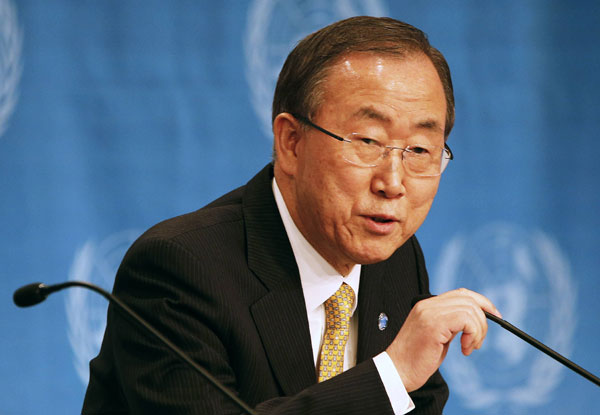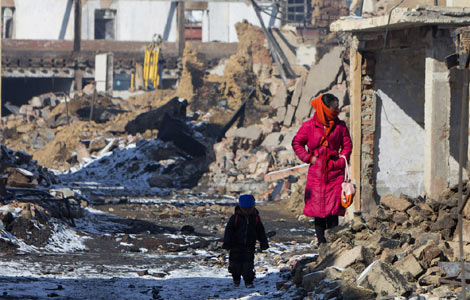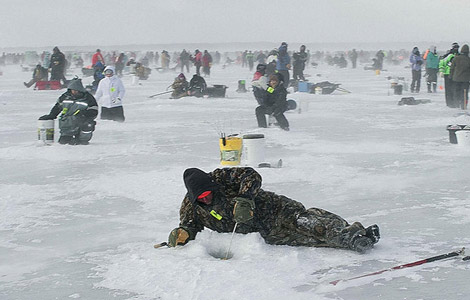Geneva II conference on Syria kicks off
Updated: 2014-01-23 10:48
(Xinhua)
|
|||||||||||
 |
|
UN Secretary-General Ban Ki-moon addresses a news conference after the Geneva-2 peace talks in Montreux January 22, 2014.[Photo/Agencies] |
MONTREUX, Switzerland -- A UN-backed international conference started Wednesday at the Swiss lakeside city of Montreux, aiming to end a three-year-long conflict in Syria.
The meeting, dubbed Geneva II and chaired by UN Secretary-General Ban Ki-moon, gathered representatives from both the Syrian government and the opposition for the first time in three years.
"After nearly three painful years of conflict and suffering in Syria, today is a day of fragile but real hope," Ban said in his opening remarks.
"For the first time, the Syrian government and the Syria opposition, countries of the region, and the wider international community are convening to seek a political solution to the death, destruction and displacement that is the dire reality of life in Syria today," he said.
He told representatives that all members of the international community bore the duty to help the Syrian people "end conflict, determine their political system and future, and start rebuilding their country."
"The Geneva Communique sets out a number of key steps for a Syrian-led transition, starting with the establishment of 'a transitional governing body with full executive powers, formed by mutual consent'- including over the military forces and security and intelligence services," Ban noted.
"I call on the Syrian delegations to engage seriously and constructively. Great challenges lie ahead but they are not insurmountable," he said.
The UN chief also urged all participants to impress upon both sides the necessity and inevitability of a political solution.
"I count on you to encourage the Syrian sides and their delegations to reach a comprehensive settlement based on the Geneva Communique," he added.
The conference also saw foreign ministers and officials from nearly 40 other countries, including those from the five permanent members of the UN Security Council - the United States, Russia, China, France and Britain - along with delegates from regional powers, such as Turkey, Saudi Arabia, Iraq and Qatar among others.
U.S. Secretary of State John Kerry called the conference a "beginning" of "what will obviously be a tough and complicated negotiation."
"Peace talks to end a war and to end a struggle like this always are tough," Kerry said.
"Mutual consent, which is what has brought us here, for a transition government means that that government cannot be formed with someone that is objected to by one side or the other. That means that Bashar al-Assad will not be part of that transition government," he said.
"There are, in this room, all of the players who have the ability, with the exception of one or two, to have an impact on the choices that are made here," he said. "People who are supporting different groups are here. These people have the ability to affect the outcome."
Russian Foreign Minister Sergei Lavrov urged participants to "do everything to help the Syrian government and the opposition to pool efforts with the objective of eradicating terrorism."
"The threat of Syria's turning into a hotbed of international terrorism is the most serious problem," he said.
He expected all third parties to encourage Syrians towards achieving consensus and restrain from predetermining final agreements.
Chinese Foreign Minister Wang Yi told participants that the path of peace talk between different parties from Syria is bound to be tortuous with twists and turns, therefore confidence, patience and persistence were needed so as to find a middle way.
To resolve the conflicts in Syria is urgent, while the priority is to cease fire and stop violence, Wang noted.
"Military actions are doomed to fail," he said, urging different parties from Syria to stick to the road of political resolution, so as to find a middle way that suits Syria's real national situation and addresses interests of both sides.
Wang stressed that voices from all parties be equally heard, and all ethnical and religious groups and factions have their rights and interests balanced, especially minority groups, women and refugees.
"We should be wary of any behavior of discrimination, instigation and revenge," he said.
As for the international community, Wang said it should play a positive role as a major mediator, giving advice that is helpful for reconciliation, but must not impose any political scheme on Syria.
Related Stories
Geneva II could be first step to solve Syrian crisis 2014-01-22 09:18
Syrian opposition to attend Geneva II peace conference 2014-01-19 05:50
Preparations for Geneva II 'on track': UN chief 2013-12-24 11:12
Jordan to attend Geneva II conference on Syria 2013-12-23 10:34
UN withdraws Iran invitation to Syria talks 2014-01-21 11:33
Today's Top News
Xi urges leading group to push reforms
Big rise in Chinese overseas
Boeing delivers record number of planes to China
Li calls for cooperative global economic system
China to keep up with transgenics
Police welcome microblog tip-offs
China OKs 12 more free trade zones
Man, 36, executed for rape, murder of sex slaves
Hot Topics
Lunar probe , China growth forecasts, Emission rules get tougher, China seen through 'colored lens', International board,
Editor's Picks

|

|

|

|

|

|





